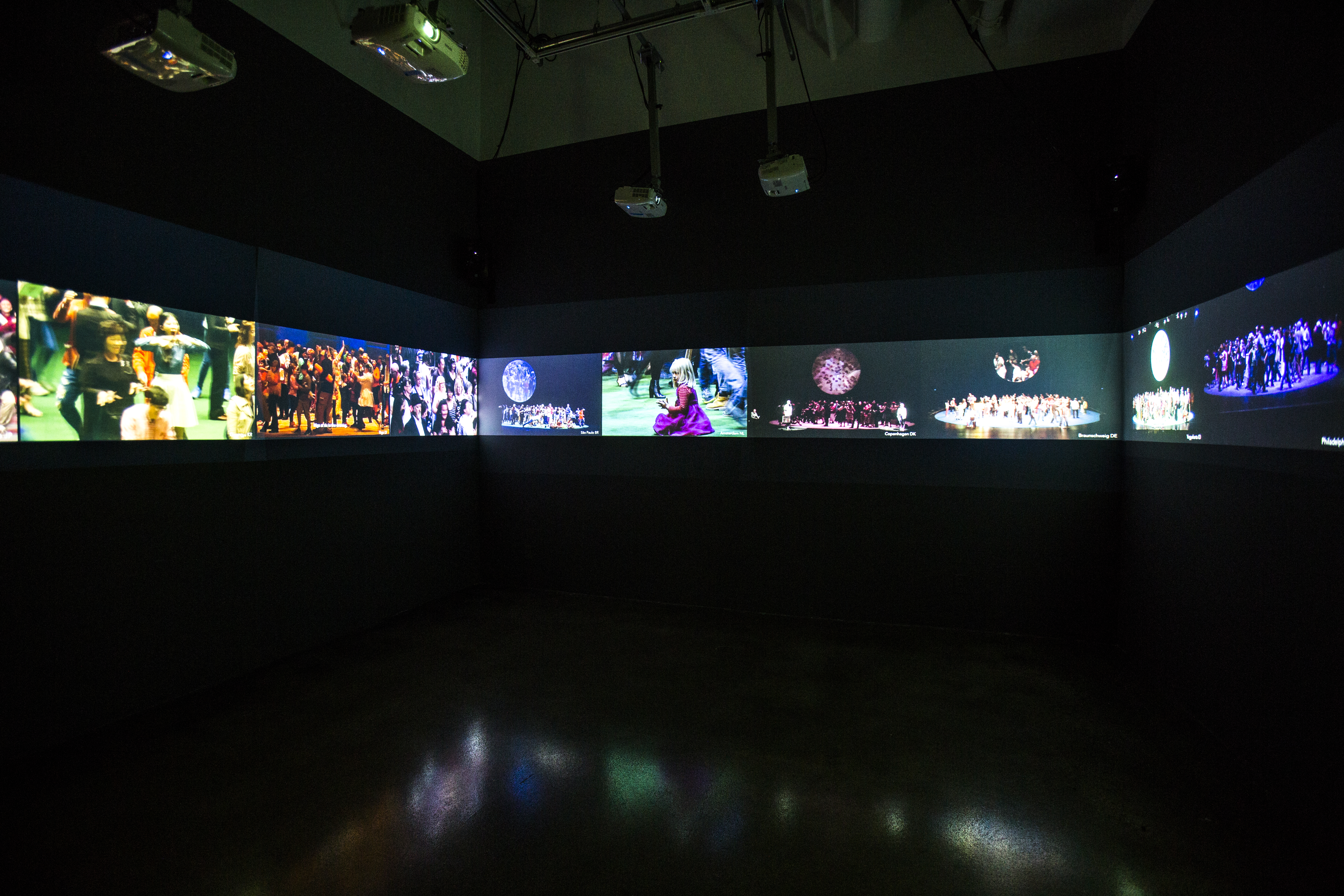This Spring, for the first time in the US, spectators can engage directly with the art and performance of the Berlin-based collective Rimini Protokoll (Helgard Kim Haug, Stefan Kaegi, and Daniel Wetzel) in City as Stage, a multidisciplinary work in two parts: 100% City, an immersive video installation housed at the MCASB, and Home Visit USA, a series of interactive performances hosted at different Santa Barbara homes.
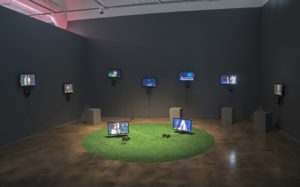
Rimini Protokoll (Helgard Kim Haug, Stefan Kaegi, Daniel Wetzel), 100% City, 2008-16, HD video, Installation view at Museum of Contemporary Art Santa Barbara, 2017, Video concept & realization by Marc Jungreithmeier, Courtesy the Artists. Photo: Wayne McCall
Home Visit enlists the participation of non-actors, individuals from the community who meet at a stranger’s home to follow directives from ‘the brain,’ an electronic smart bot designed by the artist collective. An initial question is posed by the brain: “Who will eat cake?” And throughout the performance there is a real vanilla cake being baked.
Despite the banality of the mystery—“who will eat cake?”—Home Visit is a ludic thriller. The playful fighting for a piece of cake highlights allusions to political and financial polemics. Inevitably, the cake will call into question each individual’s solidarity, conformity, and greed. The cake, like the pie charts it replicates, will be used to divide the population.
In their absence, the brain stands in for the directors. Equipped with a ticker tape that provides written commands, the brain controls the behavior of participants. The surveillance technology introduced by the brain alludes to discourses on privacy and commerce, while smartly playing on authority’s psychological power to enable individuals to relinquish control and to do as told.
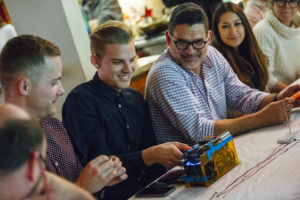
Rimini Protokoll (Helgard Kim Haug, Stefan Kaegi, Daniel Wetzel), Home Visit USA, performed in Santa Barbara, CA as part of the exhibition Rimini Protokoll: City as Stage at Museum of Contemporary Art Santa Barbara, 2017, Photo: Brett Bollier
The brain persistently sounds its alarm to reinsert distance: this is not a gathering of friends, these are strangers participating in an exercise that will slowly bring them closer through an awareness of the details of each player’s life (Tell a story about your birth city), socio-political perspectives (What political party have you donated to?), and then threaten those connections in games of alliance and risk (Earn one point for naming the players with the most money in their wallet).
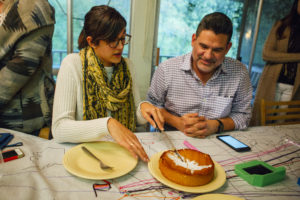
Rimini Protokoll (Helgard Kim Haug, Stefan Kaegi, Daniel Wetzel), Home Visit USA, performed in Santa Barbara, CA as part of the exhibition Rimini Protokoll: City as Stage at Museum of Contemporary Art Santa Barbara, 2017, Photo: Brett Bollier
Those who score the most points will eat cake. Home Visit is a microcosm of a governed society: who eats cake is ultimately decided by the value system established by the brain.
Whereas in Home Visit performativity conflates with spectatorship, in the video installation 100% City, the first US museum exhibit of Rimini Protokoll’s participatory theatre, despite the immersive features, dimmed lights, and wall-to-wall projections, spectatorship is the dominant mode of reception. This is not to say however that the exhibit does not achieve a dramatic repositioning of their work: from theater performance to art installation. Rimini Protokoll’s 100% City effectively summons the viewer to engage critically with performances from 10 years and 28 cities around the world. 100 citizens of each city perform on stage to Rimini Protokoll’s directives. The participants portray their alignments and divides through colors, lights, raised hands, testimonials, and so on. The viewer of 100% City is not the 101st voice, but rather bears witness to the breakdown of fixed cultural divisions.
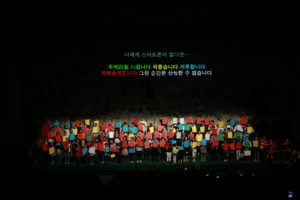
Rimini Protokoll (Helgard Kim Haug, Stefan Kaegi, Daniel Wetzel), 100% Gwangju, performed at Gwangju Culture & Art Center, 2014, Courtesy the Artists. Photo: Ahn Gabjoo
100% City portrays the multicultural plurality of modern society and the limits of one individual’s knowledge of others. Emergent themes in this art installation are 1) the people around you that you know, you do not know; 2) the strangers around you that you do not know, you know; 3) cultural/identity groups are shifting and unfixed (For example, Are you a Christian? Are you a cancer survivor? Your group may be different for each answer and yet both criteria can be used to define you); 4) if we allowed taboo questions (sexual abuse, financial hardship, immigration status…) into our common dialogue, we may have more empathy for others from different cultural groups.
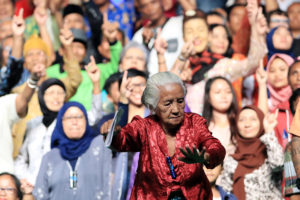
Rimini Protokoll (Helgard Kim Haug, Stefan Kaegi, Daniel Wetzel), 100% Yogyakarta, performed at Concert Hall Taman Budaya, Yogyakarta, 2015, Courtesy the Artist and Goethe-Institut Indonesien. Photo: Berto Gesit
The proliferation of multilingual voices in 100% City conjures one of the most basic questions of human existence: What is it to know someone?
The recommendation of this reviewer is that you attend both 100% City and Home Visit USA. Be both the spectator and the performer.
Rimini Protokoll, “City as Stage,” January 22 – April 30, 2017 at MCA Santa Barbara, 653 Paseo Nuevo, Santa Barbara, CA 93101, mcasantabarbara.org.

